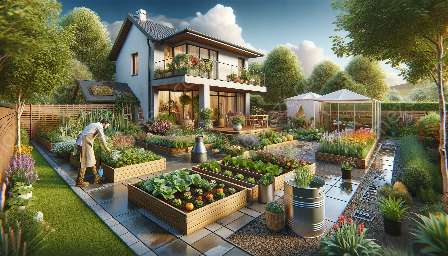Home gardening is a rewarding and fulfilling hobby that allows you to create a beautiful oasis right in your backyard. Whether you're an experienced gardener or just starting out, there are numerous techniques you can utilize to transform your home into a lush and vibrant space. In this comprehensive guide, we'll explore a variety of home gardening techniques that not only enhance the beauty of your home but also comply with home rules and regulations.
Creating a Sustainable Garden
One of the fundamental principles of home gardening is to create a sustainable and environmentally friendly garden. To achieve this, consider implementing techniques such as composting, mulching, and water conservation. Composting involves recycling kitchen scraps and yard waste to create nutrient-rich soil for your garden. Mulching helps retain moisture in the soil and suppresses weed growth. Additionally, practicing water conservation by using rain barrels and drip irrigation systems can reduce water usage while keeping your garden healthy and vibrant.
Adhering to Home Rules and Regulations
Before embarking on any home gardening project, it's crucial to familiarize yourself with local home rules and regulations. Some neighborhoods may have restrictions on the types of plants, landscaping features, or garden structures allowed. By researching and understanding these guidelines, you can ensure that your gardening efforts are in compliance with home regulations, avoiding any potential issues or conflicts with neighbors or homeowners' associations.
Maximizing Small Spaces
Even if you have limited outdoor space, there are creative techniques to maximize your home garden. Vertical gardening, container gardening, and raised bed gardening are all effective ways to make the most of small areas. Vertical gardening involves growing plants on walls or trellises, while container gardening utilizes pots and planters to cultivate a diverse array of plants. Raised bed gardening allows you to create custom-sized planting areas, making it ideal for small yards or urban environments.
Implementing Organic Practices
Embracing organic gardening practices aligns with the home ethos. By avoiding synthetic fertilizers and pesticides, you can create a healthy and chemical-free environment for your plants, as well as contributing to the overall well-being of the home ecosystem. Utilize organic fertilizers, natural pest control methods, and companion planting to promote biodiversity and enhance the resilience of your garden.
Embracing Biodiversity
Diversifying your garden with a variety of plants, flowers, and even beneficial insects can create a thriving and balanced ecosystem. Incorporating native plants, attracting pollinators, and fostering habitat for beneficial insects are all effective techniques to promote biodiversity and ecological harmony within your home garden.
Maintaining a Balanced Ecosystem
Creating a balanced ecosystem within your home garden involves methods such as crop rotation, interplanting, and maintaining healthy soil. Crop rotation helps prevent soil depletion and disease buildup by alternating the types of plants grown in specific areas. Interplanting compatible species together can enhance nutrient uptake, pest resistance, and overall productivity. Additionally, enriching the soil with organic matter and practicing proper soil management techniques supports a healthy and thriving ecosystem.











